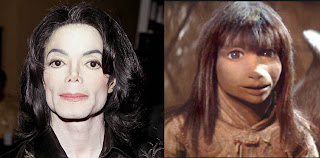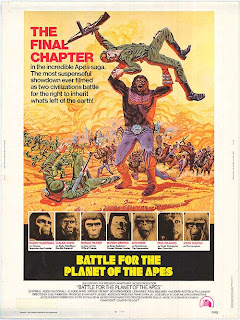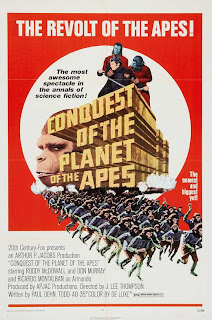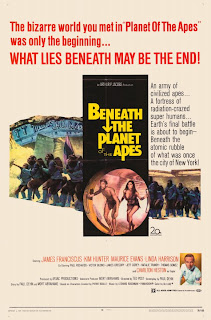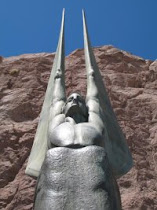So what did I gain from this experience? What did I learn? Not a whole lot, really. I learned that even bad sci-fi from the '70's can be better than the bad sci-fantasy we have these days. I learned that George Lucas did not invent the bad, nonsensical, series-ruining prequel.
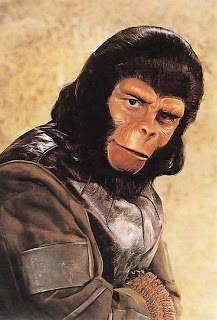 I gained a lot of respect for Roddy McDowall as an actor. Yes, these are silly roles in cheesy movies, but he put real effort into each film he was in. Underneath all of that make-up, facial expressions were pretty much non-existent. So he improvised. He worked his nose to make the Ape-nose appear to be sniffing; exaggerated his eyebrow movement to get some action in the prosthetic forehead; blew out air to "puff out" the mouthpieces in anger. He clearly experimented with finding new ways to emote from behind that mask, and I really admired the work that took.
I gained a lot of respect for Roddy McDowall as an actor. Yes, these are silly roles in cheesy movies, but he put real effort into each film he was in. Underneath all of that make-up, facial expressions were pretty much non-existent. So he improvised. He worked his nose to make the Ape-nose appear to be sniffing; exaggerated his eyebrow movement to get some action in the prosthetic forehead; blew out air to "puff out" the mouthpieces in anger. He clearly experimented with finding new ways to emote from behind that mask, and I really admired the work that took.I also learned, just after beginning my marathon, that there is yet another Planet of the Apes movie coming out. I discovered this on my own by accident, but it was also brought to my attention by several friends through email and Facebook. It's called Rise of the Planet of the Apes and stars James Franco (!?). I admit, the trailer does look interesting. Clearly, it won't tie in to any of the "official" movies or timeline, but they did name the head Ape "Caesar," which is a nice touch.
Here's the link to the trailer, since when I embed video it doesn't normally follow when this post gets re-posted on Facebook: Apes Will Rise.
Planet of the Apes
Three-letter word review: Yes!One sentence summary: Astronaut Taylor crashes on an alien world where Apes are dominant and men are barbaric, mute animals.
Strange '60's quote/reference: Taylor: "That's right, Lucius. Never trust anyone over 30."
Watchability: High. I would even rate this one a must-see. But if you're with kids or even adults who haven't seen it, do your best to hide the DVD case and the surprise ending.
Beneath the Planet of the Apes
Three-letter word review: Wow.One sentence summary: Is it possible? Astronaut Brent searches for Taylor, crashes on an alien world where Apes are dominant, and finds him in an underground New York in the Forbidden Zone where telepathic mutant humans worship an atomic bomb.
Strange '70's quote/reference: Ursus: "The only good human... is a dead human."
Watchability: Strange. It's not really bad so much as it is a mess. There's a lot going on here, so for just plain craziness I would actually recommend it.
Escape from the Planet of the Apes
Three-letter word review: Hmm.One sentence summary: Ape-ronauts (yes, they actually call them that in the film) Cornelus & Zira flee their planet in Taylor's crashed ship, only to crash themselves on Earth in the 1970's.
Strange '70's quote/reference: Dr. Zira: "A marriage bed is made for two. But every damn morning, it's the woman who has to make it. We have heads as well as hands. I call upon men to let us use them!"
Watchability: Medium. The first half is quite silly and strange, but it becomes rather dramatic by the end.
Conquest of the Planet of the Apes
Three-letter word review: Grr.One sentence summary: Caesar, Ape-child of Cornelius & Zira, grows up in a world of Ape slavery and eventually leads a revolution.
Strange '70's quote/reference: Woman smoking cigarette: "Funny, now that I know these things won't kill me, I don't enjoy them."
Watchability: Low. The plot is very thin and the outcome pre-determined. Why bother?
Battle for the Planet of the Apes
Three-letter word review: Ugh.One sentence summary: Ape leader Caesar leads a group of Apes and humans after a global apocalypse, only to be attacked by irradiated human holdouts.
Strange '70's quote/reference: I'm sure there was one, but I can't remember.
Watchability: Very low. Don't waste your time. Seriously.
Planet of the Apes (2001)
Three-letter word review: Boo!One sentence summary: Astronaut Davidson crashes on an alien world where Apes are dominant and men are their barbaric-ish slaves.
Strange '60's quote/reference: Attar: "Take your stinking hands off me, you damn dirty human!"
Watchability: Unbearable.






